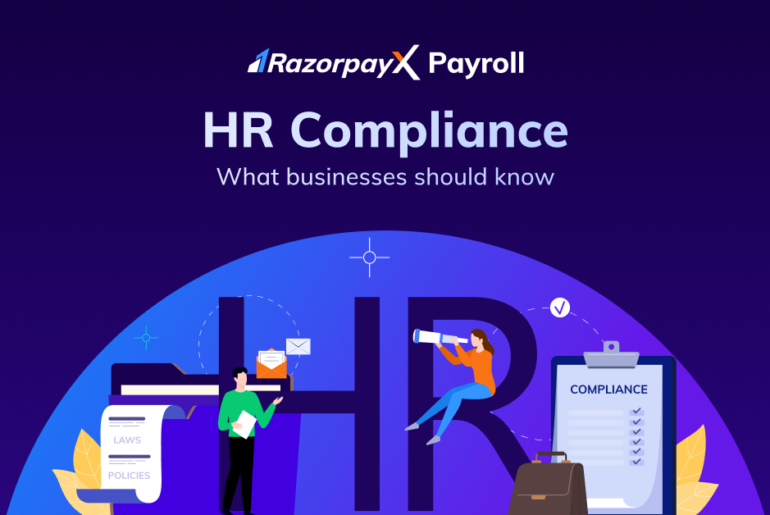HR compliance is one of the most critical and challenging tasks of the HR function. There are specific statutory laws that every organisation needs to follow to ensure employee well-being and legal compliance.
Before we dig deeper into setting the right approach, let us first understand the meaning of HR compliance in detail.

Table of Contents
What is HR Compliance?
HR compliance is the process of ensuring that an organisation adheres to the employee and labour laws of the state by setting up relevant policies and systems.
Any non-compliance with laws and regulations can lead to business shutdown and increased costs due to heightened employee turnover rates. Therefore, companies must be proactive and take effective measures to ensure HR compliance.
Take the Payroll Maturity Assessment for Free
In India, HR Compliance consists of three major parts:
- Recruitment and onboarding: This includes adherence to laws related to anti-discrimination, background checks, and employment contracts.
- Employee management: This includes compliance with laws related to working hours, wages, overtime, leave, and benefits.
- Termination of employment: This includes laws related to notice periods, severance pay, and non-compete agreements.
There are also various types of compliance that HR teams must keep in mind.
Compliance with Laws: This includes following statutory legislation and government policies put in place to protect employees and the workplace. For example, all employees in India must undergo POSH training. TDS and PF are also legally enforced deductions.
Here’s RazorpayX Payroll handles automated tax compliances.
Compliance with Regulatory Bodies: Apart from government legislation, businesses also have to follow the rules of the regulatory bodies that they fall under. For example, the Employee’s Provident Fund Organisation (EPFO) has rules regarding the deduction of PF and VPF from salaries.
Compliance with Contracts: All businesses sign contracts with freelancers, contract workers and employees. An important part of HR compliance is adhering to the rules and regulations in these contracts.
Importance of HR Compliance
HR compliance is an unavoidable part of any business that employs even one employee. Here’s why:
- To avoid legal liability. Employers are legally required to comply with a wide range of HR laws and regulations. Failure to do so can result in costly lawsuits, fines, and other penalties.
- To protect employees. HR laws and regulations are designed to protect employees from discrimination, harassment, and other forms of unfair treatment. By complying with these laws, employers can ensure that their employees are treated fairly and with respect.
- To create a positive work environment. When employees know that their employer is complying with HR laws and regulations, they feel more secure and valued. This can lead to increased employee morale, productivity, and retention.
- To maintain a good reputation. Businesses that are known for being HR compliant are seen as more ethical and trustworthy. This can lead to increased customer loyalty, partnerships,
Challenges in HR Compliance
Compliance is not an easy function – it is constantly changing and must be done with perfect accuracy. Not doing so can result in huge losses for the organisation. Here are some of the challenges that HR teams face while ensuring compliance.
Lack of Automation
Manual compliance is a tedious, error-prone process. Most businesses in India still file taxes and returns manually, which can lead to missed deadlines or incorrect filings. Today, the only payroll software on the Indian market with automated compliance is RazorpayX Payroll.
Automated software calculates your taxes, automatically files them with the various government portals and allows instant access to all challans in one place. Most importantly, automation keeps up with changes in regulation without any manual intervention.
Complex Regulatory Environment
India has a complex and fragmented regulatory environment for HR compliance. There are over 100 laws and regulations that employers must comply with, and these laws vary from state to state. This can make it difficult for employers to keep up with the latest requirements.
For example, the Minimum Wages Act, 1948 sets the minimum wages that employers must pay their employees. However, the minimum wages vary from state to state. For example, the minimum wage for unskilled workers in Delhi is ₹17,384 per month, while the minimum wage for unskilled workers in Bihar is ₹11,791 per month.
Lack of Awareness
Employee laws are constantly changing, and employers need to be aware of every single update. This can be challenging without a big HR team and expertise.
For example, in 2021, the Maternity Benefit Act, 1961 was amended to increase the paid maternity leave period from 12 weeks to 26 weeks. Employers who were not aware of this amendment may have failed to comply with the new law, which could have resulted in penalties and fines.
Here’s how RazorpayX Payroll helps businesses stay up-to-date on employee laws in India.
HR Compliance in India: Best Practices
Here are some of the best practices to ensure HR compliance:
Stay up-to-date on laws and regulations: To ensure accurate and effective policy formulation, you should be updated with the laws and regulations and any changes in them. For example, every Union Budget brings with it a number of changes to tax slabs – it is very important for employers to stay updated on these changes.
Staying updated on law and regulation is difficult when done manually – compliance is a tricky subject and without expertise, can be complex.
Learn more about automated regulatory compliance
Align HR policy with compliance: HR policies and procedures should be clear, concise, and easy to understand. They should also be regularly reviewed and updated to ensure that they are compliant with the latest laws and regulations.
Train HR staff on HR compliance requirements. HR staff should be trained on how to identify and mitigate compliance risks. This training should be ongoing and should cover all aspects of HR compliance, including recruitment, hiring, onboarding, performance management, compensation and benefits, and termination of employment.
Automate your HR processes. There are a number of software solutions available that can help you automate your HR processes. Automating HR processes can help to improve accuracy and efficiency, and can free up HR staff to focus on other important tasks.
How to Automate HR Compliance?
Today, most businesses choose to automate their HR compliance. With software like RazorpayX Payroll, you can have your entire payroll process automated, integrated and compliant in under an hour.
- Automated HR compliance such as TDS, ESI, PF, etc.
- 45+ integrations with top HR platforms like DarwinBox and Oracle HRM
- Periodic return filing.
- Compliance reports.
- High accuracy.
- Updated at regular intervals.
FAQs
What is an HR audit checklist?
It is the list of all the compliances that the company needs to follow. This checklist helps the HR department keep a track of all the compliances that have been followed and what more needs to be done.
What is an HR Compliance Audit?
An HR compliance audit is a process of checking the HR compliance policies of the organisation against the statutory requirements. It involves talking to important business people and getting more information about the business laws and regulations, and checking whether all of them are being followed or not.
Why is HR compliance important?
HR managers should stay updated about the changes in labour and business laws. HR compliance is important because it helps the organisation avoid the risk of penalties, fines, and legal troubles.





